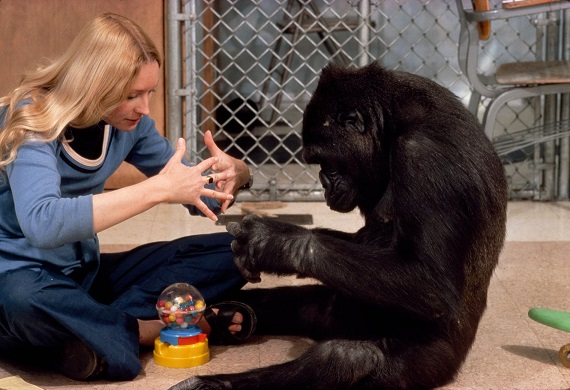|
home | what's new | other sites | contact | about |
||||||
|
Word Gems exploring self-realization, sacred personhood, and full humanity
Editor's Essay
animal psychologist Francine Patterson and Koko the gorilla
The subject of animal communication, I feel, is both extremely interesting and important as it provides a foil against which we might better know ourselves. It’s a topic that I’ve looked at over the years; especially, the research concerning the teaching of hand-signs to higher-level animals, such as gorillas, chimpanzees, dogs, and others. So much could be said here. I must purposefully offer only the briefest outline of my findings as this study is worthy of volumes of discussion. I will direct you to one of the best treatments of this inquiry and encourage you to get more details there.
Editor's note: The following information is from Augros & Stanciu's The New Biology, chapter three, "Animals and Man."
Augros & Stanciu's George Stanciu, PhD, theoretical physics
The problem, as I see it, as one approaches this subject, is that of two opposing camps: Most, not all, of those teaching hand-signals tend to anthropomorphize the animals; quickly, the furried creatures become beloved animals, virtual family members. Objectivity can now easily be lost with findings skewed in favor of bestowing upon the communicating animals a status of proto-human; and more. On the other side, we find the Darwinistic animal psychologists. They view all creatures in terms of Descartes’ machine model. Everything is viewed deterministically; all animal behavior is seen as a reactive activity against some manipulating force. For these radical materialists, animals have no true interior life at all, no aspect of agency at all, no sense of awareness at all. The materialists cannot be trusted to present even-handed conclusions concerning these animal-communication studies as they have a vested interest in minimizing the role of Consciousness as basis of reality. (See the “Evolution” article for much discussion on these issues.) animals are not almost-humans; a very wide cognitive chasm separates us So, where does this leave us? The research data, fairly examined, reveals that animals are not robots, automata, or machines with no sense of agency or awareness; only the materialists are in the dark concerning what every pet-owner knows, that each animal is an individual with its own “personality.” But, all this acknowledged, neither are animals budding humans, just a small step below us cognitively, endowed with rudimentary, but true, abilities to rationalize, conceptualize, and authentically problem-solve. No, this is not case. As I make these statements, I suddenly find myself in despair in terms of adequately addressing these questions in a short space. You will need to look at the fuller treatment in “The New Biology.” However, though the following, by themselves, will not be totally convincing, I offer these assertions from Augros and Stanciu: for the chimp, its purpose in using words does not extend to human motivations for language; virtually all of the chimp's employment of words becomes an exercise in requesting or demanding something, or avoiding some unpleasantness In all – all – of the years of teaching chimps and gorillas, none of their language represented a high-minded search for knowledge for its own sake, a detached philosophical pursuit of the truth. Instead, their language expressed a provincial desire for some pain-avoidance, some external good to be received, some benefit to be acquired and experienced. animal language is so "means to an end" We do not diminish any of this. These animals are intelligent. But their intelligence does not reach to the lofty levels of higher-order human cognition which might seek for understanding, wisdom, and knowledge – and these, for their own sake – even if there is no banana in the deal at the end - and without "the banana," or some fairly-immediate gratification, they wouldn't say a word; if you see what I mean. for animals, even of a higher order, words are little more than a tool, an extension, of instinctual self-preservation and do not express a full-bodied rationalization I must leave this discussion, though we’ve hardly broached the subject. There is too much to say. But even this much, the principle outlined just above, is probably the sum-and-substance of it.
|
||||||
|
|



